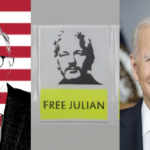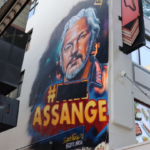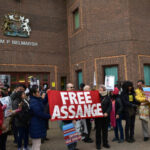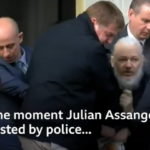Julian Is Coming Home: Assange’s Plea Deal Freedom Is a Victory for Us All
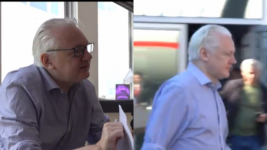
Footage of Julian Assange sitting in a room close by a runway at London Stansted Airport, prior to walking freely from the building towards a small passenger plane and boarding at 5 pm local time Monday afternoon, was posted at 10 am Tuesday morning eastern Australian time by WikiLeaks.
The Townsville-born son seen chatting in the room at one of London’s peripheral airports discussing some paperwork is very close to being a free man. He was not handcuffed at the airport. He was not shackled. And as he walked to the plane, he was not flanked by police nor corrections officers.
“Julian Assange is free,” WikiLeaks said on X. “He left Belmarsh maximum security prison on the morning of 24 June, after having spent 1,901 days there. He was granted bail by the High Court in London and was released at Stansted Airport, during the afternoon”.
On departing the UK for the first time since 2010, Assange was bound for Saipan, capital of the Northern Mariana Islands, a US western Pacific territory, which will permit him to plead guilty to one espionage-related offence in a US court, whilst not having to enter the United States mainland.
And although Assange has paid an incalculable price over 12 years of confinement – the last five remanded in Belmarsh and the initial seven holed up in London’s Ecuadorian Embassy – this outcome is a victory for the Australian journalist, his supporters and global press freedoms.
Third superseding indictment
According to a 25 June document filed at the US District Court for the Northern Mariana Islands, Assange is set to appear at 9 am Saipan time, same time zone as Sydney, on Wednesday 26 June for an initial appearance, arraignment, and plea hearing before US Chief Judge Ramona V Manglona.
Julian will plead guilty to one count of conspiracy to obtain and disclose national defence information, contrary to section 793(g) of the Espionage Act of 1917 (Title 18, USC). The offence carries a fine of up to US$10,000 and/or up to 10 years imprisonment.
The criminal charge document filed with the court on Tuesday alleges that Assange conspired with Chelsea Manning, a US Army intelligence analyst, who held top secret status and was deployed to forward Operating Base Hammer in Iraq.
The felony sheet further alleges Assange “unlawfully conspired” with Manning to receive and obtain secret national security files, wilfully communicating those files obtained from an authorised person, as well as those provided by an unauthorised person, to persons not entitled to receive them.
This fresh indictment replaces the 24 June 2020 second superseding indictment, which contained 18 charges, 17 from the Espionage Act and a final computer hacking charge, which together carried a combined maximum penalty of 175 years imprisonment.
The plea deal is Assange pleads guilty to this one charge, and he is sentenced to 62 months prison time, of which he has already served whilst on remand in Belmarsh prison, following his April 2019 arrest. And from there, Julian can return to Australia with his family: his wife and two boys.
A glimpse of victory realised
As the news that Assange had boarded a plane and left the UK broke this morning at around 10 am Sydney time, there was a collective shock that soon morphed into elation, as the 12-year-long saga that saw an Australian journalist expose the crimes of Empire and suffer terribly for it.
But there have been hints that a change was coming since the UK High Court delivered a ruling on 20 May, which many supporters, and even his wife and colleagues at a press conference days prior, thought could see the WikiLeaks founder extradited immediately.
The two High Court justices that presided over the last hearings in the UK extradition case that began in 2020, didn’t accept the final assurances Washington gave in regard to Assange’s treatment in the US prison system once he arrived there, and instead they permitted him to appeal once more.
And in a sign of just how grim the case had become in mid-May, WikiLeaks editor-in-chief Kristinn Hrafnsson stated five days before to the High Court ruling that it’s “abundantly clear” that there’s “institutional corruption on a judicial level” in the UK, and the trial “has been rigged against Julian”.
But following the High Court ruling on the Monday, Hrafnsson pronounced, “It was such a victorious moment, to finally get a glimpse of hope into this case, and a glimpse of victory. I think it is a turning point for the entire fight.”
And while the path ahead was not clear then, the WikiLeaks editor was spot on.
A safe bet
For those not following the long soap opera that has been the US persecution of the journalist behind the greatest triumph of his profession in the 20th century, that Assange is now on US territory in Saipan, capital of the Northern Mariana Islands in the Pacific, is yet another bizarre twist.
But there is method to this madness, as the assurances provided most recently to the court involved fears that once in the US, Assange might be denied the right to free speech under the US first amendment due to his nationality and that a reframing of charges may trigger the death penalty.
The US assurances, however, did leave it open for him to be denied first amendment protections, which was similar to the case of the first set of assurances that the US gave the UK courts back in early 2021, as Washington again provided assurances with a caveat.
Due to the nature of Assange’s “transgressions” he was likely to be placed in special administrative measures (SAMS) while on remand, which is a system of isolation and prison conditions so detrimental to the detainee that it breaks them, and it was considered Julian may take his own life.
Along with the three other assurances, the guarantee not to apply SAMS was accepted, even though it was given with the proviso that Washington might change its mind if the Australian citizen did anything else wrong at a later date that might then warrant such measures.
Saipan, however, is considered a safe bet. And let’s hope it is.
And let’s hope that Julian Assange, the most impactful journalist of the century, despite so many of his Australian colleagues not being graceful enough to extend him the mere title of “journalist”, is home in Australia by this time next week.


